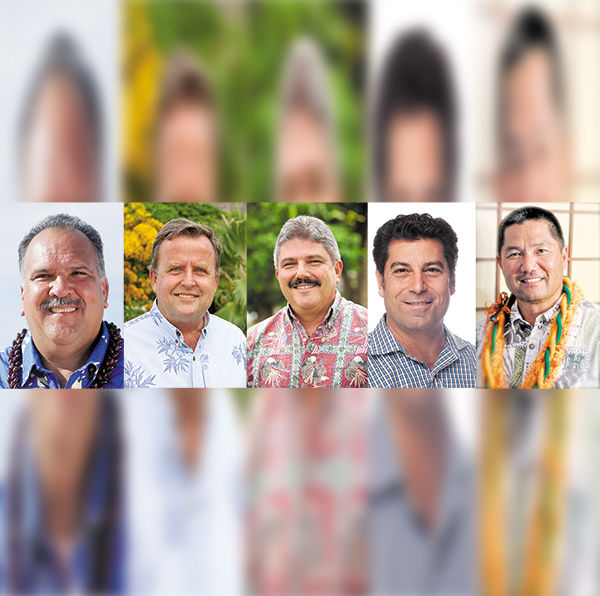LIHUE — A federal judge ruled Monday that Ordinance 960, a county law regulating the use of pesticides and genetically modified crops, is pre-empted by state law and therefore invalid.
“This decision in no way diminishes the health and environmental concerns of the people of Kauai,” Magistrate Judge Barry M. Kurren wrote. “The Court’s ruling simply recognizes that the State of Hawaii has established a comprehensive framework for addressing the application of restricted use pesticides and the planting of GMO crops, which presently precludes local regulation by the County.”
Councilman Gary Hooser, who introduced the measure, said he was disappointed, but that Monday’s ruling is “not the end of the story.”
“One ruling by one federal magistrate does not decide the entire issue,” Hooser said.
Speaking to media outside of a Hawaii Conference of Mayors meeting in Honolulu Monday, Mayor Bernard Carvalho Jr. echoed statements he made in October when he vetoed the bill and released the county attorney’s legal opinion.
“I always said … I agree (with) the intent of Ordinance 960,” he said. “But I felt that the law was not proper and legal in ways to proceed. And that was one of my major issues, with it being legal.”
In January, the island’s four biotech seed companies — Syngenta, BASF, DuPont Pioneer and Agrigenetics Inc., a company affiliated with Dow AgroSciences — filed suit in U.S. District Court in Honolulu, arguing the county violated the United States and Hawaii constitutions, multiple federal and state laws and the Kauai County Charter in passing the bill.
In a joint statement Monday, the companies said they were pleased with the judge’s decision.
“As we have maintained from the outset, the state and federal government already have comprehensive regulation of pesticides and GMOs and the County of Kauai has no power to regulate in these areas,” they wrote.
Ordinance 960 (formerly Bill 2491) was passed via a veto override in November and slated to go into effect Oct. 1. It required large agricultural companies to disclose pesticide use and the presence of GMO crops, as well as establish buffer zones around sensitive areas, including schools and hospitals. After Carvalho vetoed the bill, he released the county attorney’s opinion to the public that the law was legally flawed.
The county hired outside counsel of McCorriston Miller Mukai MacKinnon LLP to defend the law. The defense team grew in April when Kurren allowed Earthjustice and the Center for Food Safety to intervene and represent several nonprofit organizations, including CFS, Ka Makani Ho‘opono, Pesticide Action Network and Surfrider Foundation.
Earthjustice and CFS say they are analyzing legal options.
Earthjustice attorney Paul Achitoff said that Kurren is only one judge — that the fight is far from over.
“I’m going to be recommending to our clients that they appeal to the 9th Circuit and that’s the next step,” he said by phone.
Since Bill 2491 was introduced, Councilman Mel Rapozo stuck by his position that it was legally flawed and unfairly targeted the biotech industry, and voted against it.
Rapozo said Monday’s ruling came as no surprise. If a person reads state law objectively, it’s clear that the county is pre-empted from regulating pesticides and GMOs, he said.
“The council felt they wanted to test this out in court, which I thought was irresponsible,” he said.
Councilman Ross Kagawa, who voted with Rapozo against overriding Carvalho’s veto, said he is still frustrated with fellow council-members who chose to ignore County Attorney Mauna Kea Trask’s 66-page legal analysis of the bill and put Kauai taxpayers on the hook.
“I’m still upset even though I knew it was going to happen,” he said of the ruling.
Mauna Kea Trask told The Garden Island earlier this month that it was “impossible to estimate” how much the total legal bill would be for the lawsuit. To date, the council has authorized $210,000.
Bennette Misalucha, executive director of the Hawaii Crop Improvement Association, a trade group representing the agricultural seed industry in Hawaii, called Monday’s ruling a “major victory for Hawaii’s agricultural industry and for farmers everywhere who use accepted and standard farming practices.”
“We are pleased the federal judge has validated that the State of Hawaii already has a comprehensive framework in place for addressing the application of restricted use pesticides,” she said in a statement. “The proposed Kauai County bill was therefore unnecessary.”
News of Monday’s ruling traveled fast, with many local residents taking to Facebook to share their thoughts.
The issue surrounding GMOs and pesticide use on Kauai has proven divisive. Several council meetings on Bill 2491 lasted into the wee morning hours, with dozens of emotional testimonies from each side.
One man who attended most if not all of those meetings was Waimea resident Klayton Kubo. He said the saddest part is no one seems to be focusing on the health and well-being of Westside residents. Rather, the focus is money, he said.
“It’s been over a decade for me,” he said, referring to the time he has been fighting to bring attention to the issue. “So what the hell!”
A public hearing on the proposed rules for Ordinance 960 scheduled for today at the Kauai War Memorial Convention Hall has been canceled in light of the ruling.
“The county’s special counsel is reviewing the court’s decision,” Carvalho said in a statement.
Hooser said there have been many bumps in the road during Bill 2491’s journey.
“We’ve persevered because this is a real issue,” Hooser said. “We will continue to persevere.”
While pre-empted by state law, the court also ruled Ordinance 960 is not federally pre-empted.
•••
Chris D’Angelo, environment writer, can be reached at 245-0441 or cdangelo@thegardenisland.com.


